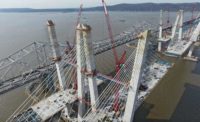Anticipating a possible unwelcome buyout offer, Fluor Corp (FLR-NYSE) has adopted a poison pill.
Alan Boeckmann, the contractor executive chairman, said in a statement that the measure "will protect stockholders from efforts to capitalize on recent market volatility as a result of the COVID-19 pandemic.”
Formally known as a shareholder rights measure, the poison pill ups the cost of acquisitions in hope of warding off a takeover.
[For ENR’s latest coverage of the COVID-19 pandemic, click here]
In Fluor's statement, issued March 25, the company said the measure can't prevent a takeover but will encourage a potential hostile acquirer to negotiate terms and "protect against abusive tactics to gain control of the Company without paying all Fluor stockholders a premium."
Fluor, which still has a big cash balance, has run into trouble on fixed-price projects, reporting charges last year. The U.S. Securities and Exchange Commission is conducting an investigation of the contractor's past accounting and financial reporting.
Previously, Fluor had said it is delaying filing its annual financial report prior to the end of the month because of its internal report and recent developments on two projects.
In a response to the SEC and for its own review, Boeckmann told investors Feb. 18 that “the company is looking at its prior revenue recognition, charges and related control environment” on one project at the U.S. Radford Army Ammunition Plant in Radford, Va.
British Aerospace Engineering is the prime contractor updating power, infrastructure and manufacturing facilities at the site, and Fluor is working on several parts under a design-build, fixed-price contract that covers a package boiler, a cellulose cutter warehouse and a multi-phased new nitrocellulose production facility.
In a March 24 note. Andrew Wittmann, construction sector stock analyst for Baird Equity, noted that while "cash burn for problem projects likely turns free cash flow negative," and add restructuring costs, "good jobs could partially offset."
Fluor isn’t alone in its fixed-price problems. In August, ENR reported that Fluor, SNC-Lavalin Group Inc. and Granite Construction Inc. had decided to exit fixed-price contracting as a business-growth strategy in the wake of megaproject risk-sharing imbalance and project losses.




